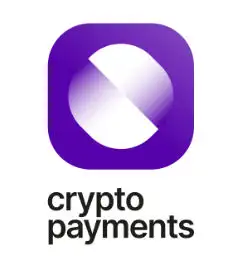🌐 Company OverviewCryptopayments
is a fintech company focused on cryptocurrency payment solutions, committed to providing efficient and secure payment and settlement services for businesses and individuals through blockchain technology. The company is positioned in the global market, particularly in the field of cryptocurrency payments, and seeks to simplify cross-border transactions and reduce transaction costs in the traditional financial system. The following is a comprehensive analysis from multiple dimensions such as basic information, enterprise classification, service content, regulatory compliance, and technical infrastructure.
📋 Basic information
BackgroundCryptopayments
was founded in the context of the rapid development of the cryptocurrency industry to solve the high cost, slowness, and complexity faced by traditional payment systems in cross-border transactions. By integrating blockchain technology and cryptocurrency payment gateways, Cryptopayments provides merchants and consumers with a decentralized payment method for e-commerce, cross-border money transfers, and peer-to-peer transactions.
shareholding structure
, the shareholding structure has not been disclosed in public channels. Equity in crypto startups is typically made up of founders, early-stage investors, and an employee stock ownership plan (ESOP), but the exact distribution is obtained through the company's registration documents or investment disclosures.
nature of
thecompanyCryptopayments is a private limited liability company (based on its entity information registered in the United Kingdom) focused on providing cryptocurrency payment services and belongs to the fintech and blockchain technology industry.
operating status,
according to the latest records of Companies (as of 2025), CRYPTOPAYMENTS is in "Active" status and is not subject to liquidation or bankruptcy proceedings.
🏷 Company classification
Cryptopayments belong to the intersection of the fintech (FinTech) and blockchain technology industries, which can be categorized as:
first-level classification: fintech
second-level classification:
Payment solutions level 3 classification: Cryptocurrency payment gateway
companies mainly serve merchants and individuals who need to accept cryptocurrency payments, covering scenarios such as e-commerce, cross-border payment, and financial services.
📊 Market segment
Cryptopayments is positioned in the global cryptocurrency payment market, targeting customers including:
B2B: e-commerce platforms, retailers, and service providers who need to integrate cryptocurrency payment capabilities.
B2C: Individual consumers who wish to make payments using cryptocurrency.
Geographic market: With the UK as the core, radiating to regions with high cryptocurrency usage such as Europe, North America, and Asia.
According to market research, the global cryptocurrency payments market is expected to continue to grow in the coming years, and Cryptopayments has a niche in this fast-growing segment.
🛠
serviceCryptopayments offers the following core services:
Cryptocurrency payment gateways: APIs and plugins for merchants to accept payments in multiple cryptocurrencies such as Bitcoin (BTC), Ethereum (ETH), and more.
Instant settlement: Convert crypto to fiat currencies (e.g., USD, EUR) and deposit into a merchant's bank account to reduce the risk of price fluctuations.
Wallet integration: Users can pay directly through cryptocurrency wallets.
Cross-border payment: Provide low-cost and fast cross-border transaction solutions, suitable for international e-commerce and remittance.
The service is mainly aimed at small and medium-sized enterprises and individual users who need efficient payment solutions.
🛡️ Regulatory and compliance information
Cleverlee UAB is included in the list of Virtual Currency Service Providers (VASPs) of the Lithuanian Registry of Legal Entities for the provision of cryptocurrency services. These services are regulated by the Lithuanian Financial Crime Investigation Service (FCIS or FNTT) to ensure compliance with Anti-Money Laundering (AML) and Counter-Terrorism Financing (CTF) regulations.
regulator: Lithuania Financial Crimes Investigation Agency (FCIS)
Regulatory Effective Date: 7 April 2023Regulatory
Responsibilities: Oversee the compliance of virtual currency service providers, including customer due diligence, transaction monitoring, and reporting obligations.
📄 Anti-Money Laundering (AML) & Counter-Terrorism Financing (CTF) Policy
Cryptopayments is committed to the highest standards of integrity and applicable laws and regulations, and its AML and Counter Terrorism Financing Policy includes the following key aspects: cryptopayments.com
Customer Due Diligence (CDD): Implement a comprehensive Know Your Customer (KYC) process to confirm the identity of all customers and assess the risk of their transactions.
Corporate Due Diligence (KYB): Verification of the identity and legitimacy of a business entity, including obtaining and verifying business registration documents, ownership and management structures, and conducting relevant database screening.
Transaction Monitoring: Monitor and report suspicious transaction activity to ensure that it is not used for money laundering or terrorist financing.
💱 trading products
The trading products supported by Cryptopayments are mainly cryptocurrency payment services, including:
cryptocurrencies: mainstream cryptocurrencies such as Bitcoin (BTC), Ethereum (ETH), Litecoin (LTC), etc.
Fiat currency conversion: Convert cryptocurrency payments to fiat currencies such as USD, EUR, GBP, etc.
Payment links: Provide payment links for small merchants who don't have a website to easily accept cryptocurrency.
The company does not offer cryptocurrency trading or investment products, focusing solely on payment processing.
📱 trading software
Cryptopayments offers the following transaction-related software tools:
Merchant Dashboard: for managing payments, viewing transaction history, and generating reports.
APIs and SDKs: For developers to integrate payment gateways into marketplaces or applications.
Plugins: Payment plugins that support mainstream e-commerce platforms such as WooCommerce and Shopify.
Mobile apps: iOS and Android apps may be available to make it easier for merchants and users to manage payments (not explicitly mentioned on the website).
The software is designed with ease of use and cross-platform compatibility in mind, making it suitable for users with different technical abilities.
💸 deposit and withdrawal methods
deposit method
cryptocurrency deposits: Users can transfer funds directly to the address provided by Cryptopayments via supported cryptocurrency wallets.
Fiat Currency Deposits: Merchants may deposit fiat currencies via bank transfer (depending on the service).
withdrawal method
cryptocurrency withdrawals: merchants can choose to withdraw their earnings in cryptocurrency to a designated wallet.
Fiat currency withdrawals: Withdraw to a linked bank account via bank transfer, SWIFT or SEPA transfers are supported.
📞 customer support
Cryptopayments offers the following customer support channels:
email: submit a support request through the official website contact page.
Online Help Center: Provides frequently asked questions (FAQs) and usage guides.
Social media: Respond to user inquiries through X (@CPaymentscom) and Facebook.
Live chat: Live chat support may be available on the website (depending on the page).
The supported language is mainly English, and other major languages (such as Chinese, Spanish) may be covered, but there is no clear information.
🔑 Core business and services
Cryptopayments' core business focuses on cryptocurrency payment gateway services, including:
payment processing: providing merchants with a complete solution for accepting cryptocurrencies, including payment confirmation and settlement.
Risk management: Reduce the risk of cryptocurrency price fluctuations with real-time conversion capabilities.
Technology integration: APIs, plug-ins, and custom solutions are available to meet the needs of businesses of all sizes.
Compliance support: Assist merchants in complying with local anti-money laundering and data protection regulations.
These services are designed to simplify the cryptocurrency payment process and improve transaction efficiency and security.
🖥 Technical infrastructure
Cryptopayments' technical infrastructure is based on blockchain technology and cloud computing, including:
blockchain network: supports mainstream blockchains such as Bitcoin and Ethereum to ensure that transactions are transparent and tamper-proof.
Distributed Ledger Technology (DLT): Used to record and verify payment transactions.
Cloud server: provides high availability and scalability, and supports global user access.
Encryption: AES-256 encryption and multi-sig technology are used to protect user assets.
API architecture: Based on RESTful APIs, it supports high concurrency and fast integration.
The Company may work with blockchain node providers or cloud service providers (e.g., AWS, Google Cloud) without specific disclosure.
⚖️ Compliance and risk control system
compliance systemCryptopayments
strictly adheres to AML and CTF AML and CTF AML and CFT requirements by taking measures such as:
CTF/AML process: Authenticate users to prevent illicit money flows.
Transaction Monitoring: Monitor unusual transactions in real-time to identify potential money laundering or fraud.
Data protection: Comply with the General Data Protection Regulation and protect user privacy.
risk control system
price fluctuation management: reduce the risk of cryptocurrency volatility with instant fiat currency conversion.
Network security: Deploy firewalls, DDoS protection, and regular security audits.
Operational risk: Develop a business continuity plan (BCP) to ensure uninterrupted services.
The compliance and risk control system is the core of Cryptopayments' legitimate operation and user trust.
🌍 Market positioning and competitive advantage
Market PositioningCryptopayments
is positioned to provide small and medium-sized businesses and individuals with simple and fast cryptocurrency payment solutions, distinguishing them from traditional payment giants (e.g., PayPal, Stripe) and large blockchain payment platforms (e.g., BitPay, CoinPayments).
competitive advantage
low transaction fees: Blockchain transaction costs are lower than traditional payment systems.
Fast settlement: Support real-time crypto-to-fiat currency conversion, reducing capital turnaround time.
Ease of use: Provides intuitive dashboards and plugins to lower the technical barrier to entry.
🤝 Customer Support & EnablementCryptopayments
empowers customers by:
Technical support: Detailed API documentation and test environment for developers.
Training resources: Help merchants learn about cryptocurrency payments through blogs, tutorials, and videos.
Customized services: Customized payment solutions for large enterprises.
Community Engagement: Engage with users through X and Facebook to gather feedback and improve the Services.
These initiatives aim to improve the user experience and drive the adoption of cryptocurrency payments.
🌱 Social Responsibility and ESG
Cryptopayments does not disclose specific environmental, social, and governance (ESG) plans. Based on industry trends, companies may demonstrate social responsibility in the following areas:
environment: Blockchain payments may use energy-efficient consensus mechanisms (such as Ethereum's PoS) to reduce energy consumption.
Social: Supporting small businesses and financial inclusion in underdeveloped regions through low-cost payment services.
Governance: Comply with regulatory requirements and maintain transparent operational standards.
🤲
Cryptopayments does not disclose specific strategic partners, but may cooperate with the following types of institutions:
blockchain networks, such as node providers of Bitcoin and Ethereum networks.
E-commerce platforms: such as Shopify, WooCommerce, offer payment plugins.
Banks and payment institutions: Banks or payment processors that support fiat currency settlements.
Technology providers: such as cloud service providers or cybersecurity companies.
The expansion of the partnership ecosystem will help Cryptopayments expand its market coverage.
💰 Financial health
Cryptopayments' financial data is not publicly available. According to Companies House records, the company remains in normal operation, indicating that it is financially sound enough to sustain the business. The financial health of fintech startups often relies on revenue growth, financing support, and operating cost control, but specific metrics (e.g., revenue, profit margins) are available through annual reports.
🚀 future roadmap
Cryptopayments has not disclosed detailed plans for future development. Based on industry trends and company positioning, the following directions may be focused in the future:
support for more cryptocurrencies: Add support for emerging cryptocurrencies and stablecoins (such as USDT, USDC).
Expand your market: Enter high-growth markets such as Asia and Africa.
Technology upgrades: Optimized payment processing speed and user interface.
Compliance expansion: Apply for regulatory approvals in more countries or regions to improve global compliance.













